When Chris Packham announced he was heading to Malta to report on the island's annual spring bird shoot as if he was a war correspondent covering a conflict, even his admirers probably thought he was guilty of hyperbole.
But after a week in which the naturalist has detained by police for five hours, shoved to the ground by gunmen and witnessed the illegal killing of dozens of endangered birds, his mission to raise awareness of the annual slaughter of migratory birds has been more like a battle than he imagined.
Over the last week, the Springwatch presenter has also pioneered a new form of wildlife filmmaking. Operating independently, with a voluntary crew of BBC freelancers, Packham has uploaded a daily video blog to his website, documenting his confrontations with hunters and struggles to save rare birds.
It has been an unexpected success – with each short episode proving to be compelling viewing and a powerful fundraising tool. Packham's efforts have raised €55,000 in a week for the charity Birdlife Malta, which is campaigning to end the shooting of thousands of turtle dove and quail on the Mediterranean island each spring.
“It was physically draining but emotionally it was draining too,” said Packham, after a week working 20-hour days on the island. “It's so depressing, then it's shocking and sad and then it makes you very angry. It's a bird hell. It's the last place on Earth you would want to be with feathers.”
His films show him breaking down on several occasions, particularly when he visited a Maltese vet and sees a Montague's harrier, which has to be put down after it was illegally shot.
Malta allows 9,798 hunters to shoot up to 16,000 turtle dove and quail each spring but Packham found injured and dead birds illegally shot last week included swifts, yellow-legged gulls, kestrels and a little bittern.
The most shocking moment, said Packham, was when he watched 20 migrating Montagu's harriers – a vanishingly rare species in Britain – fly onto the island to roost one evening. Later that night, he was called by a local bird-lover who had found hunters roaming through the fields with torches and guns, trying to shoot these majestic birds of prey as they roosted on the ground.
“That's the mentality of these people. It's so different from the UK,” he said.
Maltese hunters have reacted angrily to a procession of British naturalists arriving on the island to campaign against their spring shoot, which is forbidden by the EU birds' directive. Malta was taken to the European court of justice over its shoot but subsequently satisfied the EU that its annual derogation from EU law was within the rules.
After five days watching birds illegally shot down and becoming embroiled in tense stand-offs with the police and hunters, Packham was summoned to a police station and interviewed for five hours. “It was nice to sit down for five hours in one place,” he said. “The chairs weren't terribly comfortable but at least we weren't running around.”
At one point, a hunter confronted Packham and told him: “Get the hell out of here. You are in our country. You are provoking me.”
But Packham denied criticisms that his intervention represented colonial-style finger-wagging, when Britain still has its own problem with the illegal killing of raptors.
“We are all Europeans now. These birds don't have boundaries. They are flying all over the place,” said Packham. “We should be collectively trying to preserve these species. There's not a nationalist bone in my body. I'm a European, a citizen of Earth. The principle reason for our visit was to show our support for the Maltese people and their feelings on this issue.”
Malta is set to have a referendum on its spring shoot and an opinion poll found that 60% of local people were opposed to the slaughter. “When we met 'normal' Maltese people, they were in full agreement [with the anti-shooting campaign],” said Packham. “They feel the shooting is an embarrassment, a threat to their country's reputation and harmful to tourism, and they see it as meaning they can't access their own countryside in spring.”
Packham decided to make his own films in Malta after failing to persuade conventional broadcasters to cover the issue – including his own employers, the BBC. But the naturalist denied his outspoken campaign and independent film-making would lead to conflict with the BBC.
“I'm proud to work for the BBC and I wholeheartedly support their principles of impartiality but as a campaigner it can be frustrating,” he said. “I think the BBC understand that I'm employed on the basis of my genuine commitment to the cause. If I wasn't a concerned conservationist I shouldn't have my job on their programmes. I wave the flag for the BBC and I'll continue to do so.”
During his time in Malta, Packham has also produced a short film for Springwatch, which he hopes will be broadcast in May.
Packham's rising profile has led to comparisons with Sir David Attenborough, who has been much less outspoken on conservation issues during his illustrious career.
“David grew up in a different era. Obviously he's one of the uber-heroes and I've tremendous respect for him,” said Packham. “But I'm an old punk rocker and that whole ethos was getting things done yourself. My mantra is to shout above the noise and we've got to be heard.”
Malta's tourism officials have criticised the anti-shooting protests by Packham, as well as Brian May and Bill Oddie, but Packham said he was not calling for a boycott of the island.
On his final day, he visited the island of Camino off the Maltese coast and saw more birds than he had all week – spotted flycatchers, hoopoes and golden oriole. “It really identified what a valuable resource Malta could be for birds and birders,” he said.
Like other birdwatchers, Packham hopes that if the spring hunting is halted, Malta could benefit from a surge in ecotourism and become a birdwatching destination – rather than a black hole for rare species.
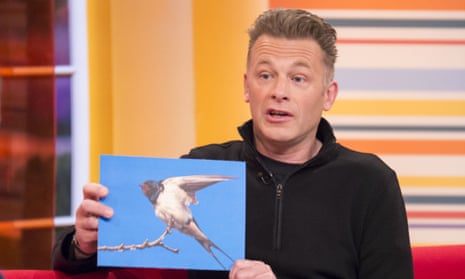
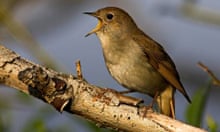
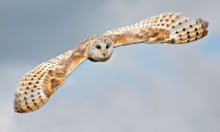
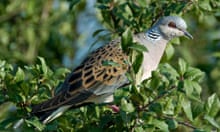
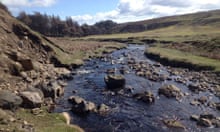
Comments (…)
Sign in or create your Guardian account to join the discussion